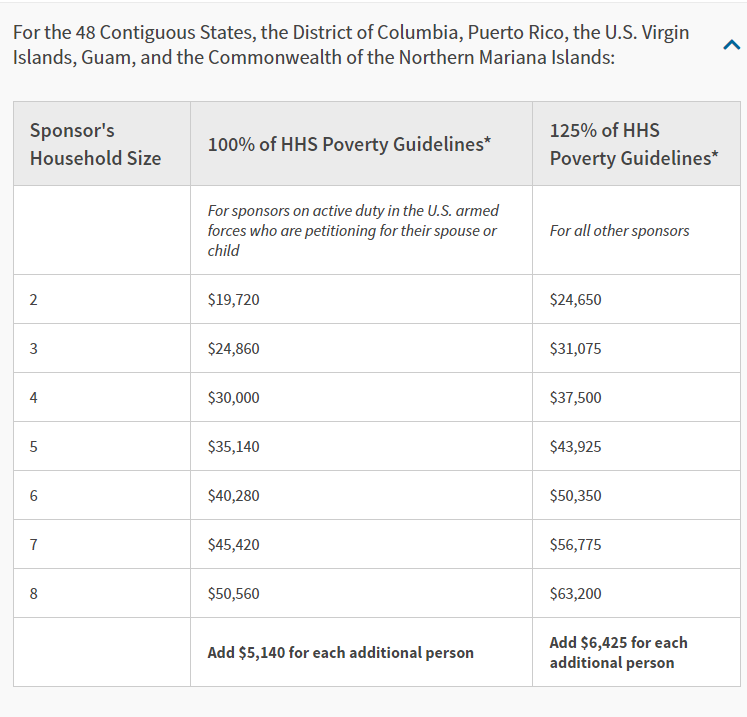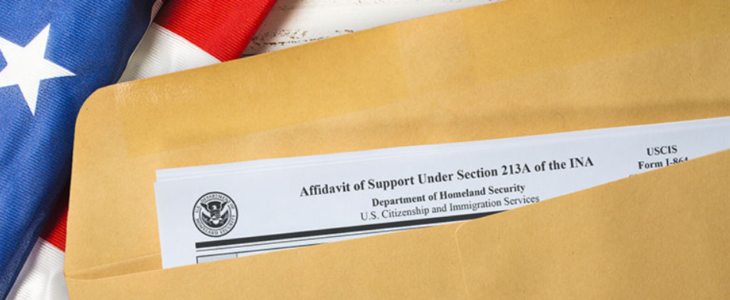Filling out I-864, affidavit of support, is almost always a necessity if you’re sponsoring someone for a family-based green card. You will file Form I-864, which is published by the United States Citizenship and Immigration Services.
If you don’t have enough money to sponsor the individual alone, you can ask a friend or relative to be a joint sponsor. The main sponsor is the person bringing the foreign national, while the joint sponsor is the one assisting in financially supporting the immigrant should the need arise.
The joint sponsor’s liability is the same as the primary sponsor’s under the immigration law regarding the Form I-864 Affidavit of Support. What that means is that once the joint sponsor signs the form, he or she agrees to the contract’s “joint and several” liability.
Basically, the sponsored immigrant can sue for financial support if the co-sponsor fails to fulfill their responsibility, again only if the need arises.
This is why it is important to know that the sponsor can trust that the sponsored immigrant can financially take care of themselves before they sign any document.
Please note that a sponsored immigrant’s income cannot be considered by USCIS with respect to the I-864, but the sponsor can consider that when agreeing to sign.
If you’re sponsoring someone for a lawful resident permanent card, we recommend hiring our office or any immigration attorney to assist you with this process.
What Is the Liability for an I-864 Affidavit of Support?
The form I-864 affidavit of support, published and regulated by the USCIS, is a legally enforceable contract where sponsors, primary and joint, must fulfill the agreement. The sponsor’s responsibility to the immigrant lasts until the applicant becomes a U.S. citizen.
It also continues until the lawful resident gets credited with forty quarters of work, which is usually ten years. The essence of the I-864 is to ensure the sponsor(s) provide adequate support (should the need arise) to the immigrant to avoid them becoming a public charge.
What Is a Sponsor Liable For?
The sponsor who signs Form I-864 is legally bound by contract to provide financial support for the immigrant family member. This contract is between the United States government agency and the sponsor, including the main and secondary sponsor(s).
By signing the contract, the sponsor agrees to have the sufficient income required to take care of the immigrant if the need arises. More specifically, the sponsor guarantees his or her income is at or more than 125% of the poverty line (see chart below).
How Long Is a Sponsor Liable for a Person?
A sponsor is liable for an immigrant family member until they earn forty work quarters credited toward Social Security. Also, they remain liable until the sponsored immigrant becomes a U.S. citizen or terminates the Form I-864 financial obligation.
A sponsor is usually very reluctant to sign the Form I-864 contract, which is why our firm strongly encourages applicants to apply for citizenship as soon as they qualify so that they do not have issues in the citizenship process and so that the I-864 contract can end and release the sponsor from any possible liability.
These sponsors are doing the applicant a huge favor in helping the applicant meet the public charge requirement, so it is important for the applicant to make sure that they apply for citizenship as soon as possible.
Additionally, the sponsor is liable until the sponsored immigrant is no longer a green card holder and has departed the U.S. Finally, the liability continues unless the immigrant dies or after being placed in deportation proceedings reapplies under a new affidavit.
What Disqualifies You from Sponsoring an Immigrant?
An individual is disqualified from sponsoring an immigrant if they are involved in crimes such as an offense involving kidnapping. Other crimes include crimes involving false imprisonment, solicitation to carry out sexual conduct, and using minors in a sexual performance.
Others include solicitation to practice prostitution, video voyeurism, possessing, producing, or distributing child pornography, or any conduct that, by nature, is a sex offence against minors. These crimes also hold in foreign convictions, unless the defendant did not receive a fair trial.
Who Can Sponsor an Immigrant Financially?
The main and additional financial sponsors of an immigrant must meet three requirements to qualify. First off, they must be a U.S. citizen, lawful permanent resident, or national, and they must be at least eighteen years old.
Additionally, they must reside in the United States or its territory or possession and must be doing well financially.
However, if the sponsor’s income doesn’t meet the Poverty Guidelines demand, he or she can look for additional sponsors to help share the financial responsibilities.
Is the Primary Sponsor Liable to the Immigrant?
The primary sponsor is the one who initiated the immigration process and is usually the immigrant’s spouse; they are liable to the immigrant. However, joint sponsors are often needed because the main sponsor couldn’t meet up with the poverty guidelines income requirement.
Hence, most sponsors (joint) are always financially superior to the main sponsor, explaining why they are often the main target for collection. Under federal law, the beneficiary of the sponsor can choose to sue only the primary sponsor, only the joint sponsor, or both.
What Obligations Isn’t the Sponsor Liable to Fulfill?
There are certain obligations that the United States government does not consider as means-tested benefits obligating the sponsor to repay. These include emergency Medicaid, school lunches, job training programs, student assistance for higher learning, and immunizations and treatment for communicable diseases.
Additionally, the government does not consider some kinds of adoption or foster care assistance, head start, and short-term non-cash emergency relief. The federal mean-tested public benefits include food stamps, Supplemental Security Income, State Child Insurance Program, Medicaid, and Temporary Assistance for Needy Families.
Citation website: https://www.lawfirm4immigrants.com/sponsors-liability-under-i864-affidavit-of-support/



